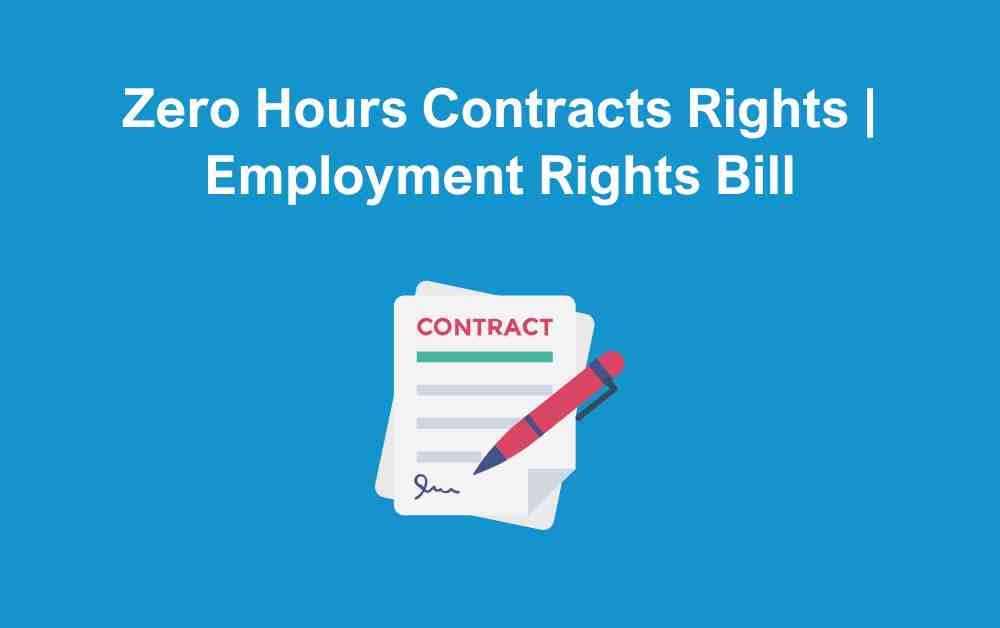The UK government’s recent Employment Law Bill could significantly shape the future of zero-hours contracts rights. These contracts, often associated with flexibility and unpredictability, are prevalent in sectors like retail, hospitality, and care. However, as scrutiny intensifies, this new legislation could drive notable reforms or even lead to phasing out these contracts.
Here, we delve into what this could mean for employers.
Understanding Zero Hours Contracts Rights
In the UK, zero-hours workers have specific rights, even within the flexible nature of these agreements. They are entitled to the National Minimum Wage and National Living Wage for hours worked, as well as paid annual leave, payslips, and rest breaks. They are also protected from discrimination under law, covering age, disability, and race.
A key aspect of zero-hours contracts rights is that workers cannot be penalised for refusing work. Employers cannot enforce exclusivity clauses that prevent workers from accepting work from other employers, allowing flexibility for additional income sources. Health and safety obligations apply regardless of contract type, ensuring that zero-hours workers have a safe work environment and appropriate training.
The Push for Reform: Why Change Zero Hours Contracts?
Zero-hours contracts have long sparked debate, with critics arguing that they exploit workers, offering little security or financial stability. Workers may find themselves on standby or called in on short notice, leading to challenges in financial planning and security, particularly in lower-income roles.
Reports indicate that around one million UK workers are on zero-hours contracts, with unions and workers’ rights groups labelling them precarious and unsustainable. This sentiment has fuelled the demand for reform, leading to the proposed changes in zero-hours contracts rights.
The Employment Law Bill: Key Changes for Zero Hours Contracts Rights
The new Employment Law Bill proposes to tackle the ‘exploitative’ elements of zero-hours contracts by providing greater security and income stability. Workers on zero-hours contracts who work a consistent number of hours over a 12-week reference period would be entitled to a contract offering guaranteed hours. This provision would allow those who desire stability to secure regular hours, giving them improved control over their income and work-life balance.
The bill, however, does not propose to eliminate this type of contract entirely. Workers who value flexibility, such as students, those with multiple jobs, or individuals with varying commitments, will retain the option of zero-hours contracts. By allowing workers to choose guaranteed hours if they regularly work them, the government seeks to address zero-hours contracts rights without removing the flexibility that some employees prefer.
This dual approach enables employers to offer structured hours to employees who desire them, while employees gain more control over their working terms. This shift reflects the government’s focus on fostering fairer and more flexible employment practices within the UK.
Repeal of the Workers (Predictable Terms and Conditions) Act 2023
This legislation will repeal the Workers (Predictable Terms and Conditions) Act 2023, which allowed employees with 26 weeks of service to request more predictable work patterns. The original Act was designed to help workers facing irregular hours gain stability, enhancing zero-hours contracts rights for those in retail, hospitality, and care roles.
Impact on Employers and Workers
For employers, these changes may require a shift in workforce management. While zero-hours contracts have provided flexibility, they can also impact workforce morale and loyalty. Providing stable hours could improve employee retention and satisfaction, potentially outweighing the benefits of the flexibility zero-hours contracts offer.
For workers, these changes may improve job security and work-life balance. Greater ability to request predictable hours and reliable shift patterns can ease financial planning challenges, especially for lower-wage employees. Those who prefer flexibility can retain their zero-hours contracts. This ensures the right balance between stability and adaptability.
A Balanced Approach to Zero Hours Contracts Rights
The Employment Law Bill represents a measured approach to flexible work arrangements. Rather than banning zero-hours contracts, it introduces a structured flexibility. This is in an attempt to empower workers to request more predictable hours while retaining flexibility for those who prefer it. This could mark a significant step towards a modernised, fairer employment landscape, balancing the needs of both workers and employers.
Preparing for the Future of Zero Hours Contracts Rights
As the Employment Law Bill progresses, both employers and employees will need to stay informed. Employers may need to review their policies, particularly around scheduling and workforce planning. This is important to comply with the new zero-hours contracts rights framework.
Final Thoughts
The Employment Law Bill’s provisions for zero-hours contracts rights could reshape the UK’s employment landscape. While the bill may not eliminate these contracts, it aims to create a balanced approach. The main aim to foster a culture of fairness and security. This reform may redefine flexible work, setting the stage for a more sustainable, supportive working environment across the UK.
For more advice on zero hours contracts, including zero-hours contracts holiday pay, contact us for HR support. We’re here to help.


